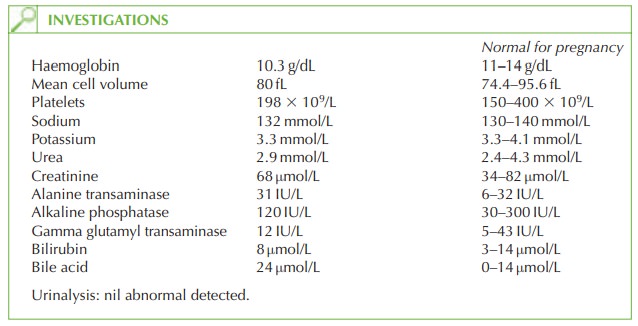Chapter: Case Study in Obstetrics and Gynaecology: General Obstetrics
Case Study Reports: Itching In Pregnancy
ITCHING IN PREGNANCY
History
A
36-year-old woman is complaining of itching. She is currently 34 weeks’ gestation in her first ongoing pregnancy, having had two previous early
miscarriages. The itching started 2 weeks
ago and she
had been using
emollient cream to try and
relieve it. Initially it was mainly over
her soles and
palms, although it is now
more generalized. She
is not aware of having changed
her washing powder
or soap recently
and no one else in her
family has been affected.
She
has not experienced any abdominal pain
although she does
have Braxton Hicks
con- tractions. There is no vaginal
discharge or bleeding. She has noticed
the baby move
more than 10 times in the last 12 h.
Examination
She looks well. Her blood pressure
is 118/76 mmHg and pulse 82/min.
No
rash is visible
on the face,
trunk, limbs, hands
or feet except
for a few excoriation
marks.
The
symphysiofundal height is 34.5 cm and the uterus is soft and non-tender. The fetus
is cephalic with 4/5 palpable abdominally.

Questions
·
What is the diagnosis?
·
How
would you further
investigate and manage this woman?
·
How will this diagnosis affect the pregnancy?
Answer:
The
woman is suffering from obstetric cholestasis (OC). This is a pregnancy-specific con- dition in which
there is intrahepatic reduction of bile excretion from the liver,
causing a build-up of serum bile acids. It usually develops
in the third trimester. The effect on the
mother is of itching, which
may be very distressing. In more severe
cases the liver
function or coagulation become
deranged and if they do then other
diagnoses such as HELLP
syndrome (haemolysis, elevated
liver enzymes and low platelets – a severe
form of pre-eclampsia) or hepatitis should
be considered. An ultrasound should
be performed to exclude other causes of obstruction such as gallstones.
There is no long-term harm to the mother. The effect on the baby however is potentially
much more serious with an association between
OC and stillbirth.
Investigations
Liver ultrasound should be performed
to exclude other causes of hepatic obstruction.
Fetal ultrasound may be performed for maternal reassurance.
Management
Symptomatic relief is obtained
from chlorpheniramine (antihistamine). Ursodeoxycholic acid can be given to relieve itching
in more severe
cases, as it reduces serum
bile acids.
Vitamin K (needed for
clotting factors) should
be given orally
to the mother
to reduce the risk of fetal or maternal haemorrhage caused by impaired
absorption.
Postnatal advice
Maternal liver function returns
to normal after
delivery, but the
mother should be warned
that recurrence may occur in a subsequent pregnancy (50 per cent) or with use of the com-
bined oral contraceptive pill.

Related Topics